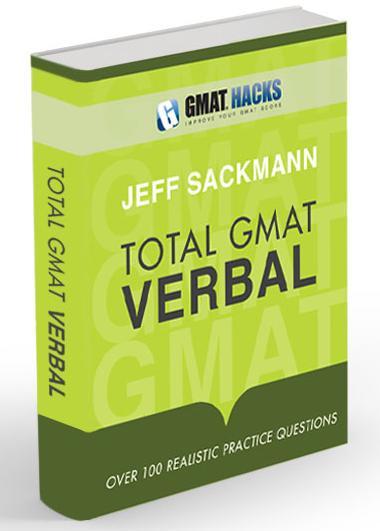
Bookshelf
|
|
Total GMAT Math Jeff's complete Quant guide, on sale now! |
|
|
Total GMAT Verbal Everything you need to ace GMAT Verbal! |
1,800 Practice Math Questions
Buy Jeff's books at Amazon.com

GMAT Official Guide, with IR
OG Math | OG Verbal
OG12 & Quant Rev solutions!
GMAT Question of the Day
Beginner's Guide to the GMAT
GMAT Hacks Affiliate Program

Recent Hacks

Categories
- General Study Tips
- Goals and Planning
- CAT Strategy
- The Mental Game
- GMAT Math Strategy
- GMAT Math Topics
- Mental Math
- Data Sufficiency
- Critical Reasoning
- Reading Comprehension
- Sentence Correction
- Analytical Writing Assessment
- Integrated Reasoning
- IR Explained
- Business School Admissions
- GMAT Prep Resources
- Practice Questions
- Total GMAT Math
- Total GMAT Verbal
- GMAT 111

Time Management and GMAT Practice Problems
| You should follow me on Twitter. While you're at it, take a moment to subscribe to GMAT Hacks via RSS or Email. |
You may have read something like this on the site before, but it bears repeating:
If you are not able to complete a GMAT Quantitative question in 2.5 minutes, you might as well not be able to complete the question at all.
That's worded a little strongly, but the message is meant to be direct: Timing is everything on the GMAT, and when you practice, you need to keep that in mind. For Data Sufficiency, the number ought to be closer to 2 minutes; for different types of Verbal questions, it varies, but the idea is still important.
How To Optimize Time Management Through Practice
As with most things, there's a right way and a wrong way. Unfortunately, most people do this the wrong way. You do not need to treat every practice session as a mini-test, a timed quiz where you allow yourself two minutes per question. Practice tests are valuable, but not every day (or close). Timing yourself over the course of 10 or 20 questions just makes you sloppy and stressed when you should be focused on developing your strategy skills.
I detail the right way here, at length. In short: go through practice problems at your own speed, giving each your best effort, trying different methods you want to test out, seeing what you can and can't do. When you stop, go back over those questions, stopping and reviewing each one that you got wrong, were not confident about, or you couldn't complete in 2 or 2.5 minutes.
Do This All the Time
If you're just starting out and not very comfortable with the underlying math, you don't need to time yourself on every question. Yet. But under any other circumstances, you should be aiming for 2-2.5 minutes on every single practice problem you do. If you can't do it, work on the problem, review the explanation, go over it with a tutor–whatever you need to do–until you can.
Eventually, you'll get 120 seconds ingrained in your head. The two minutes that used to fly by will stretch out a little longer for you, and completing each problem in that amount of time will come much more naturally. Just as important, you'll learn to recognize problems–immediately, not after you've worked on them for 3 minutes–that you won't be able to finish in the allotted time. On test day, that skill is as valuable as any other time-management technique, because you need to skip those questions.
In a future tip, I'll write more about how to identify questions you should skip on test day. In the meantime, watch the clock: during the test and during every practice session. Time management is just as important as basic content knowledge, and improving your ability will have just the effect on your ultimate GMAT score.
About the author: Jeff Sackmann has written many GMAT preparation books, including the popular Total GMAT Math, Total GMAT Verbal, and GMAT 111. He has also created explanations for problems in The Official Guide, as well as 1,800 practice GMAT math questions.
 |
Total GMAT Verbal
The comprehensive guide to the GMAT Verbal section. Recognize, dissect, and master every question type
you'll face on the test. Everything you need, all in one place, including 100+ realistic practice questions. |